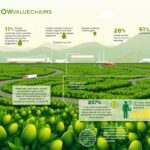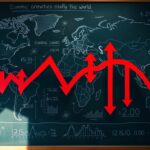Did you know that COVID-19 pushed around 100 million people into deep poverty? The World Bank shared this shocking info. It loudly calls for action against the growing wealth gap we see today, in 2023. The paradox of inequality is getting worse. The richest get richer while millions barely get by. We need to face the unfairness in our economic recovery directly.
Tackling these big problems means we must focus on fair economic answers. We’re going to dive into the wealth gap issue. You’ll see the dangers of staying on this path and discover how we can move towards fairness.
Key Takeaways
- The pandemic has pushed millions into extreme poverty, highlighting the urgency of the wealth gap in 2023.
- The wealth of billionaires contrasts sharply with the struggles of many in our society.
- The post-pandemic economy requires dedicated solutions to address economic recovery inequality.
- Systemic issues must be confronted to create a more equitable economic landscape.
- Understanding the inequality paradox is essential for developing effective strategies moving forward.
The Inequality Paradox: Understanding Its Origins
Inequality has deep historical roots, shaped by various social, economic, and political factors. We can trace today’s growing disparity to decisions made by powerful individuals. These decisions often favored a few, causing income gaps to widen.
Disparity comes from many places. Decisions about taxes, education, and workers’ rights affect wealth distribution. History shows us that prioritizing profit for a few can harm overall economic growth. By examining these choices, we see a trend of favoring profit over fairness.
Exploring the origins of inequality highlights the importance of social justice efforts. Investing in these areas can lead to a fairer future. Knowing the roots of disparity helps us push for changes that improve society for everyone.
Factors Contributing to the Wealth Gap in 2023
The wealth gap 2023 factors show a complex economic picture. Policies often benefit the rich, making income inequality worse. There are big labor market disparities too. These affect job access and pay for different groups. For example, gig jobs usually pay little and offer few benefits, which is hard on those already struggling.
Also, we can’t ignore how automation impacts jobs. It replaces many traditional roles, leaving some without the needed skills behind. This situation means there’s a growing gap between high-paid professionals and those trying to find good jobs. Data reveals the top ten percent earn more and more, while the bottom half only earns 6.5% of total income.
The Impact of COVID-19 on Economic Disparities
The COVID-19 pandemic changed our economy a lot, making income gaps bigger. Millions fell into poverty while billionaires grew richer by over 40%. This shows a disturbing trend: those who were already struggling suffered even more.
These inequalities hit women and minorities hard, leading to more job losses and less money for them. The gap between the rich and the poor got even wider, creating a shaky recovery where some people are left behind.
It’s clear the COVID-19 economic impacts hit people differently. Knowing about these differences is key to making good plans to fix the economy.
Wealth Gap 2023: A Snapshot of Current Trends
As we look into the wealth gap trends for 2023, we see big challenges in our economy. The top 1% of earners now own as much wealth as the bottom 60%. This widening wealth gap follows historical patterns and has grown due to global events.
Income inequality is getting worse, made clear by the rising cost of living. This hits lower-income families the hardest, making it tough for them to afford housing, food, and healthcare. It’s important we recognize these issues in our examination of economic inequality today.
Graphs and stats show us how serious these trends are. There is a huge need for changes in policies. We must act soon to narrow this wealth gap. By understanding this data, we can work towards a fairer future for everyone.
Systemic Inequality Solutions for a Fairer Economy
Fighting systemic inequality is key to building a fair economy. We should look at strong solutions to narrow the wealth gap. Actions like wealth taxation and progressive policies are vital.
These steps can help share resources more fairly among everyone.
Getting proper education is also vital. It’s important to make sure everyone can learn and grow their skills. By boosting access to education, we can help lessen the gap between rich and poor.
Looking at countries that have improved wealth distribution gives us good ideas. Their experiences show that the right fiscal policies can boost the economy and support fairness. As we recover from the pandemic, we need policies that focus on bringing us together and ensuring a fair recovery for all.
Universal Basic Income (UBI) as a Bridging Strategy
Exploring ways to reduce wealth gaps, Universal Basic Income (UBI) stands out. It offers a guaranteed payment to everyone, promoting financial security. This approach helps people deal with the money problems caused by new job patterns and the gig economy.
UBI brings many benefits, like economic stability. It helps people avoid poverty and stress when money is tight. With UBI, families can better their lives by investing in education and health, leading to a stronger economy.
UBI changes how we help people in need, making assistance available to all. It’s key in fighting inequality and keeping everyone financially secure. During tough times, it helps keep the economy moving by ensuring people still spend money.

Bridging Wealth Inequality through Social Equity Policies
We need to address wealth inequality by focusing on effective social equity policies. These policies help bridge wealth gaps by tackling the main causes. This makes the economy fairer for everyone.
To improve quality in society, investing more in public services is key. This includes education, healthcare, and social welfare, which all benefit those in need. By putting more money into education, we help young people get good jobs in the future. Having access to good healthcare lets everyone live healthier lives, no matter their income.
Many countries have shown that tailored social equity policies can really make a difference. For instance, those with universal healthcare have seen fewer people living in poverty. Similarly, countries that reform their education systems help their citizens climb the economic ladder.
To really tackle wealth inequality, we must focus on initiatives that help those who are often forgotten. By supporting social equity policies, we can build a community that includes everyone. This is how we make lasting changes for a better future.
The Role of Corporate Responsibility in Solving the Wealth Gap
Addressing the wealth gap is a big challenge. It needs meaningful efforts from corporations. With corporate responsibility, we can create a fair economic world. Companies can do this by being ethical, supporting fair pay, and helping communities grow.
Many firms now see their role in closing the wealth gap. By paying their taxes properly, they help fund schools and hospitals. This leads to healthier communities and smarter workers.
It’s not just about giving money away. Companies invest in community programs, focusing on education and health. These efforts make communities better and strengthen the bond between businesses and people.
The success of these efforts depends on companies really committing. They should make these good practices a key part of their business. By doing this, they help create a world that is fair and rich for everyone.
Post-Pandemic Economy: Shifts in Labor Market Dynamics
The post-pandemic economy has brought huge changes to work life. We’re seeing a big move towards jobs that let people work from home. This isn’t just a short-term thing; it’s a major shift in how jobs are structured now.

Looking at these changes, we need to think about what they mean for people working today. More people are trying out gigs or freelance work, seeking income in new ways. This shows how adaptable we are, and highlights the need for plans that protect people’s rights at work and make sure jobs are secure.
- Increased remote work flexibility is redefining job roles.
- The gig economy’s growth highlights our need for diverse income sources.
- Worker rights remain critical in this transitional period.
- Job security has become a crucial concern for many employees.
The labor market is changing fast to help our economy bounce back. As we deal with these shifts, focusing on fairness and making sure everyone feels secure in their jobs is key.
Global Wealth Distribution: Observations from Oxfam Reports
The Oxfam inequality report shares insights on world wealth, showing big gaps between the Global North and South. This inequality is more than about money. It links to climate change and unfair policies too.
Recent studies show patterns in how wealth is kept:
- Most of the world’s riches are with a few, impacting many lives.
- Differences in income affect education, health, and life quality.
- Countries in the Global South find it hard to beat poverty because of deep-rooted hurdles.
Oxfam’s findings call for us to work together globally. The numbers tell us we need change in economics and policies. This is key to fixing the imbalance.
Economic Recovery Inequality: Lessons Learned
We learned a lot looking at how the economy recovered after COVID-19. We saw that to close the gap between different groups, certain strategies work better than others. The way communities bounced back was not the same for everyone. This showed us big differences that we can’t ignore.
We found out that when policies included everyone, those areas did better. But, places without good support continued to struggle. This was because of ongoing economic troubles.
To really fight poverty, we need a plan that does several things. It should focus on better education and job training. It should help people get jobs and have access to healthcare. This way, we can face economic ups and downs better and keep all communities strong.
These insights stress how important it is to make policies that look ahead. They should solve today’s problems and also plan for a future that’s fair for everyone. Only by thinking of everyone can we overcome the tough times.
Conclusion
It’s vital to tackle the wealth gap and inequality for a better economic future. The impact of recent global events has made it clearer. Steps towards equality in economic policies are necessary.
To build a stronger future, we need to focus on including everyone. Changing structures so everyone has a chance is crucial. This means ensuring all communities have access to opportunities.
Recovery is also about fairness, not just economic growth. We all have to work towards reducing wealth differences. This calls for united, sustainable actions.
We must act now to close these economic gaps. Only by working together can we ensure fairness for all. Let’s aim for a future filled with opportunity and equity.
FAQ
What is the current state of the wealth gap in 2023?
In 2023, the wealth gap continues to grow. The richest 10% control much more wealth than before. Meanwhile, the poorest half only makes up about 6.5% of global income. This issue got worse due to COVID-19, pushing nearly 100 million people into extreme poverty.
How has COVID-19 affected economic disparities?
COVID-19 has made economic differences even sharper, leading to a K-shaped recovery. While many people have become poorer, billionaires’ wealth has jumped by over 40%. This shows the big gap between the rich and the poor during the pandemic.
What are systemic inequality solutions that could create a fairer economy?
To fight systemic inequality, we can use wealth taxes, progressive policies, and make education and healthcare more accessible. These steps are key to narrowing the wealth gap. They also support social justice and a united economy.
What role does Universal Basic Income (UBI) play in bridging the wealth gap?
UBI could help those affected by job loss due to automation or uncertain gig work. It offers a basic living standard to all. This way, UBI could help stabilize the economy in tough times and lessen wealth differences.
How can corporations contribute to solving the wealth gap?
Companies can help by paying fair wages, supporting community projects, and practicing responsible tax strategies. These actions are part of their social duty. They can greatly aid in reducing the wealth gap.
What are the implications of gig economy jobs on wealth inequality?
Gig economy jobs, which often pay little and lack job security, are making wealth gaps worse. They especially affect those in vulnerable groups. This problem stops people from moving up the social ladder.
How do global wealth distribution trends differ between the Global North and Global South?
There’s a huge wealth difference between countries in the Global North and South. This is worsened by climate change and unfair policies. Solving this requires everyone in the world to work together.
What lessons can we learn from economic recovery efforts post-COVID?
The recovery efforts after COVID-19 show that including everyone and focusing on reducing poverty is crucial for balanced growth. By focusing on lessening inequalities, we can avoid future imbalances and boost the economy in a lasting way.









































































































